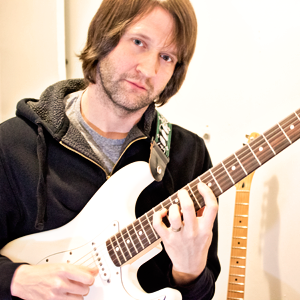"Think outside the box" originated as a guitar player saying
It's funny how your mind tricks you. Like the fisherman who caught the big one has the fish growing larger and larger over the years, many of your memories can become distorted over the time. I have a very distinct memory of seeing a Pepsi commercial as a teenager that featured B.B. King, but I've scoured the internet trying to find some record of its existence to no avail.
In the commercial, B.B. was saying how you can't just use that 'old box pattern' of the pentatonic scale (and proceeded played some really nice licks with it). To really create good music, you gotta 'think outside the box' (then he *really* played some nice stuff).
So first of all, one of my favorite things is watching geniuses try to sound bad. I've seen interviews of Scott Henderson and Bill Evans doing this as well, and it cracks me up. Even when they *try* to sound bad, they just can't.
Second of all, I don't get what people mean by 'box pattern' and while we're on the subject, 'block chords'. I conceptually understand *what* they are, but in my mind they in no way shape or form resemble boxes and blocks. It's like that SNL skit with Mike Meyers: 'the Holy Roman Empire was neither holy, nor Roman, nor an empire. Discuss.'
That aforementioned commercial is significant in my memory also because it was the first time I heard that god awful phrase 'think outside the box' move from guitar player jargon into the lexicon. As much as I cringe when someone uses that phrase in earnest, what B.B. was talking about in this (fictional?) commercial (which I may or may not have concocted in my mind over the years), is true. To take your music to the next level, you gotta 'think outside the box' (barf emoji). How?
1.) There are obvious things on the instrument.
Every instrument has cliches that are easy to fall into playing. For example, where an octave is relatively difficult for a beginner pianist to play; its relatively easy for a beginner guitarist. Where it's relatively easy to let a minor 2nd ring for a beginner pianist, it's relatively difficult for the novice guitar player to execute (barring open strings and playing the minor 2nd on the same string. I mean letting the notes ring as one would in a chord). Look for ways to play other intervals on the instrument. One easy way to play a minor 2nd where the notes ring is with the first and 4th fingers playing the 2nd and 3rd strings, in position. I was told the kids are calling this a 'chaos chord' (another barf emoji).
The 'box' pattern is relatively easy to play on the guitar, which is why so many players use it. Fingerings for melodic minor aren't quite as visually friendly, which is probably why fewer players incorporate them. So,
2.) Learn exotic scales.
The natural 7th occurring in melodic minor does make it a bit tricky to visualize at first, which is exactly why you should study it extensively. You'll find yourself digging into sounds less commonly used by guitarists. There's also harmonic minor and harmonic major, the kumoi scale, symmetrical diminished, whole tone and double augmented. There's so much information out there, music is the kind of thing you can never stop learning. I mentioned "The Guitar Grimoire: Scales and Modes" by Adam Kadmon in a previous blog. It's a great reference.
3.) Learn standard moves on other instruments
No, you don't have to start playing piano. But learning the standard licks piano players use can be very eye opening and a huge source of inspiration. What is obvious on piano or saxophone might not be so clearly laid out on the guitar. And the best players of any instrument transcend the color of the crayon they happened to pull out of the box and create art with it. I personally have reached the point where I think I've transcribed more piano and saxophone solos than I have guitar solos. In the past 15 years, that's definitely the case. Once you figure out how your instrument works, then you need to create music with it. The greats knew music, not just their instrument.
4.) Learn other styles of music
Learning new rhythms, new chord voicings, and new scales all happen when you open your eyes to new styles of music. B.B. King was constantly studying jazz because the challenge kept him coming up with new ideas for the blues. Randy Rhoads was an adept classical guitarist. By taking themselves out of what was comfortable, the 'box', they were able to break new ground in the styles they loved to play most.
Maybe that commercial I remember is just some amalgamation of ideas I had floating around in my head. Maybe it was a regional thing, and people living in Florida who were alive back then haven't figured out how to get it onto the internet yet. Either way, what B.B. said was true. To break ground in music, you've got to think outside the box. Unfortunately, what was once guitar based jargon has become the kind of thing that HR managers say in lunch meetings.
Adam Douglass has been playing guitar for 25 years and teaching for a good 20. He currently resides in Brooklyn, New York where he is an instructor; and plays with his band doing his original music, jazz standards, or whatever other gigs might come his way. His guitar of choice is the Fender Stratocaster, though if money were no object he'd have 3 or 4 of everything. He prefers tube screamer-like overdrives and clean boosts, with touch of analog delay. Hit him up at adamdouglassmusic@gmail.com, as he is always happy to discuss interesting topics.







Get noodly, but don't get soupy.